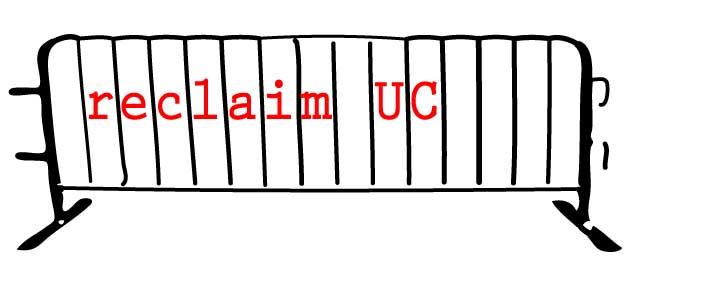Today two banners were dropped on UC Berkeley campus. One, reading "TIME UC US OCCUPY," was dropped from the Campanile (hard to see in the picture, but that's what Daily Cal reporter Damian Ortellado, who took these pictures, tweeted) while another (actually a three-banner set), reading "FUCK YOU BIRGENEAU," was dropped at Eschelman.
This unsigned letter was apparently being distributed at the site of the banner drop:
Respectfully to:
President Mark Yudof, Regents, Chancellor Robert Birgeneau, UC Chancellors, High Level Administrators, and Fellow Students.
We come to you at a time when our careers and futures look bleak, and the future of the generations to come look even more inauspicious than our own. We can all agree in saying that in our own unique perceptions of this world, we see its problems and calamities, and recognize the time has come to act.
The voices of students have spoken. We know there is something inherently wrong within our method of operation, and as you have seen, no matter what the method of repression, even allowing time to pass to kill us, we will continue to speak and voice this message. We call on each and every one of you whose eyes touch this message to act in all your ability, with full vision and intensity, to work to create the real solutions to the problems we face, especially those within our university community.
Mohamed Bouazizi and the Arab Spring, massive worker strikes world wide, the riots in London and Greece, student revolution in Chile, the network of occupiers infecting every cultural sphere of the globe made up of people in every demographic and possible category one can be placed, when viewed together, demonstrate the underlying tensions that we as a species are feeling together. We are paying attention.
These matters must be attended to or the decline of our complexly interconnected species will surely come to disaster in due time. Today we focus on education. We ask to those who can, those who in their present time have power, to help mold a new way to how we operate and function in our educational system. Education is not a commodity only to be sold to those who can afford it. We hope that all will address their own personal responsibilities to their campus and local communities, to influence those in your spheres of work and school, to create and facilitate the solutions for our educational system, and the problems our nation faces that we see fit. No matter where you stand, we must act.
We, some students here at UC Berkeley, with the privilege at our backs to be attending this great university, have recognized the need for change through our studies in class and in our homes, and are watching with a close eye of the events that are transpiring. We understand education is the solution, and this is why we fight for it. This global awakening is a direct result of mass education and awareness through the resources we have been given through the gift of technology and human creativity. We are beginning to see, and time is running out.
To you whom it may concern: our networks only grow, and we will more than gladly generate the solutions for ours futures ourselves if you don't act in all your ability. We want to see things change, not the tabling of our tuition hikes for student outrage to die out.
The time is now.
Occupy your education.
Fiat Lux,
Students
Go Bears!
...tic tock

























